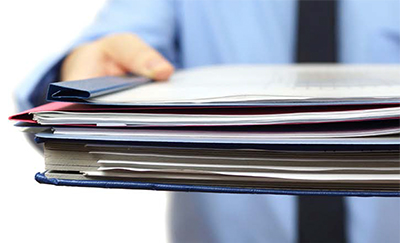Reconstructing Records Lost in a Natural Disaster
–
August 14, 2024

Reconstructing records after a natural disaster can be a tedious but necessary task. Records help people prove their disaster-related losses. More accurately estimated losses, in turn, can help people receive more recovery assistance like loans or grants.
TAX RECORDS
- Get free tax return transcripts immediately by accessing “Get Transcript” at irs.gov/individuals/get-transcript or through the IRS2Go app. The app offers many features including the ability to check on the status of your federal income tax refund, get access to payment options and directly access free tax software.
- Order transcripts by calling 800-908-9946 and following the prompts.
FINANCIAL STATEMENTS
Past financial statements can be retrieved from someone’s credit card company or bank. People can contact their bank for paper copies, or the records may be available online.
PROPERTY RECORDS
- Homeowners in need of property records may contact the title company, escrow company or bank that handled the purchase of their home or other property.
- Taxpayers who made home improvements can get in touch with the contractors who did the work and ask for statements to verify the work and cost. They may also obtain written descriptions from friends and relatives who saw the house before and after any improvements.
- For inherited property, taxpayers can check court records for probate values. If a trust or estate existed, taxpayers can contact the attorney who handled the trust.
- When no other records are available, people should check the county assessor’s office for old records that might address the value of the property.
- Car owners can research the current fair-market value for most vehicles. Resources are available online and at most libraries. These include Kelley’s Blue Book (kbb.com), the National Automobile Dealers Association (nada.org) and Edmunds (edmunds.com).
The information in this guide has been gathered from many sources, including the Internal Revenue Service, the Social Security Administration, state agencies, professional organizations and members of the NJCPA. The majority of state agencies offer online and prerecorded services. It’s best to check online or call before you visit.
Material contained within this guide should be augmented by, and used in accordance with, a certified public accountant's professional judgment. Your CPA can properly apply the tax laws and regulations to the facts and circumstances of your particular situation. For help with locating a CPA, visit findacpa.org.
The New Jersey Society of Certified Public Accountants is not responsible for any claims arising as a result of this information or its usage.
This guide was updated in August 2024. Future users of this material are cautioned that some portions, particularly tax-related information, may become outdated.